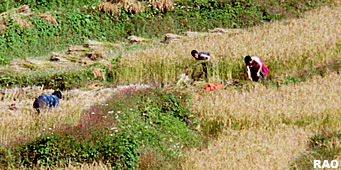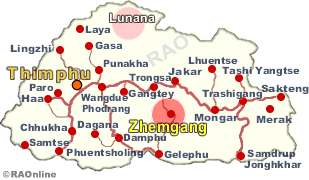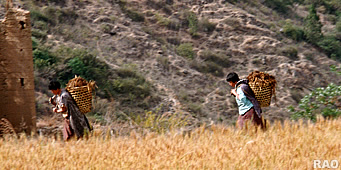| Bhutan's Economy: Agriculture |
 |
Bhutan Agriculture |
|
 |
Bhutan Information |
|
|
 |
| Agriculture |
|
|
Zhemgang:
Working in the middle of nowhere
|

|
 |
| Separating grain from husk by winnowing |
| As
dark clouds gather above Dali village in Bjoka gewog, Zhemgang, the principal
of the village community school starts to frown.
"Clouds
are a real nuisance," says principal Lungten. "The radio will not be clear."
The
radio is the only link to the outside world for civil servants like Lungten,
who work in remote lower Kheng. |
|
Cellular clogging and slow Internet speed
are not yet an issue for them nor are power black-outs.
One
must cross Dirung chu, the river that runs between Bjoka and Dali, nine
times to reach Dali. Lungten said that during monsoons, when the river
swells, the village was completely cut off.
Teachers
working in Dali and Barpong travel a day to reach the nearest health unit
and three days to the Panbang hospital. "My wife got sick last summer and
we went to Weringla in Mongar, which is about a five-hour walk from Dali,
rather than to Bjoka's basic health unit," Lungten said. Serious patients
are carried on stretcher for days, according to the health assistant, Tshering,
in Goshing.
 |
| Living
in a bamboo hut, a teacher in Kaktong community school, Pema, said that
staying up late on evenings to correct homework and make lesson plans was
difficult without electricity. "We try to make full use of the only solar
lamp our school possess but it's hardly sufficient for the students," he
said. "Bamboo huts can catch fire very easily and I am scared that my hut
might get consumed in flames one day. |
|
He
also said that getting to read newspapers once in three months was a treat.
"We let our students read last year's Kuensel."
Living
in remote areas is not cheap either.
A
bag of rice, which goes for Nu 450 in Thimphu costs about Nu 1,200 in Barpong,
Dali, Bjoka, Panthang, Goshing and Kaktong. "Transportation cost is high
here," said a shopkeeper in Panthang.
Principal
Lungten said paying more was not a problem if the diet was good.
 |
| "My family
had to sustain on kharang (corn-grain) and pacha (rattan-shoot) for the
entire summer," he said. "My children must have forgotten the taste of
momos."
People
like Lungten get a paltry sum as 'difficulty allowance' for working in
remote corners, but he said that it was the smile on the faces of his students
that keeps him going. "I get job satisfaction here," he said |
|
 |
| This
article was contributed by Tashi Dema KUENSEL, Bhutan's National
Newspaper, 2007 |
|
more
information
|

|
|






